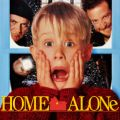
Growing up, the concept of being left home alone was both thrilling and terrifying. Those times were filled with a sense of untapped freedom, yet also tinged with the lurking shadows of imagination. For many of us who came of age in the early '90s, Home Alone epitomizes this unique junction of childhood fear and adventure. Watching it again as...
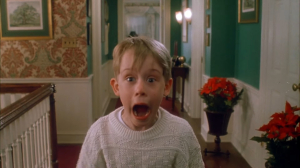
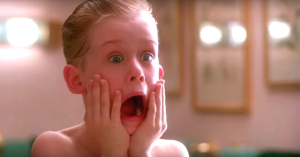
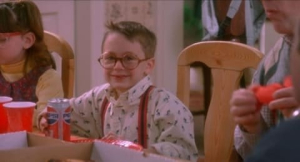
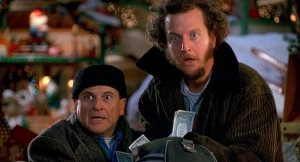
Home Alone
Growing up, the concept of being left home alone was both thrilling and terrifying. Those times were filled with a sense of untapped freedom, yet also tinged with the lurking shadows of imagination. For many of us who came of age in the early '90s, Home Alone epitomizes this unique junction of childhood fear and adventure. Watching it again as an adult, I am swept away by its charming simplicity and slapstick comedy that evoke both laughter and nostalgia.
The Origins and Premise
At its core, Home Alone is a Christmas movie like no other, one that premiered in 1990 and quickly rose to the ranks of family classics. Written by John Hughes, a legendary figure famous for capturing the essence of youthful capers and directed by Chris Columbus, the film introduced us to the unforgettable character of Kevin McCallister. The premise is deceptively simple: an 8-year-old accidentally gets left behind during a family trip to Paris and must fend off two bumbling burglars.
The film was born out of a small idea Hughes had about a family trip, and how intriguing chaos would unfold if a child were to be forgotten at home. This simple concept snowballed into a multi-layered comedic journey that effectively taps into the imagination of children everywhere. Despite its fantastical elements, there's a layer of authenticity that rises from its careful depiction of familial chaos.
The Cast's Chemistry
No review of Home Alone is complete without a nod to its brilliant cast. At the heart of it all is young Macaulay Culkin, who delivers an endearing yet cheeky performance as Kevin. Watching it today, I still find his portrayal utterly convincing—a testament to Culkin's natural talent and timeless appeal. The chemistry Culkin shares with his on-screen adversaries—portrayed by Joe Pesci and Daniel Stern—adds a robust layer of humor to the film.
Pesci and Stern, as the hapless burglars Harry and Marv, provide a comedic dynamic that perfectly balances Kevin's cunning. Their antics, executed with exceptional timing and physical comedy, are reminiscent of classic slapstick routines. Together, this cast breathes life into a story that resonates beyond its silly premise.
Suspension of Disbelief
What truly defines Home Alone is its ability to stretch credibility in a way that feels both absurd and oddly convincing. An 8-year-old laying complex traps to outwit two adults might seem outlandish on the surface. Yet, the film artfully suspends disbelief, coaxing viewers into embracing its zany narrative. It's a process akin to recalling a dream where the impossible feels palpably real.
The mischievous traps Kevin sets serve as the film's hallmark—it’s hilarious watching the villains fall prey to their ridiculousness. While as a grown-up, I can see how far-fetched these situations are, the inventive playfulness of the scenarios rekindles my childhood wonder. Rather than critique its implausibility, it invites audiences to live vicariously through Kevin's boundless imagination.
The Element of Surprise
A standout quality of Home Alone is its surprising take on the holiday genre. It masterfully veers away from the traditional sentimental approach, opting instead for laughter-inducing hysteria. There's both tension and triumph in seeing Kevin navigate the intimidating corridors of an "empty" home while his family scrambles abroad, trying to correct their mistake.
The film taps into every child's long-harbored fantasy of unbridled independence, layering surprise behind every corner Kevin turns. Whether he's outsmarting the burglars or engaging in antics most parents would be warily amused by, and these moments capture the complex innocence of a child's world.
Musical Score
John Williams' iconic score cannot be overlooked when discussing the film's indelible impact. The music serves as an emotional anchor, threading together moments of whimsy and tension. It's hard not to hum the memorable tunes long after watching, their notes echoing as timelessly as the film itself.
The score accentuates each of Kevin's adventures, pranking each scenario into ethereal jubilation. This musicality transforms the film from mere visual entertainment into an auditory delight, further embedding itself in the heart of holiday traditions.
The Humor and Heart
Home Alone thrives on humor that appeals across generations, mixing physical giggles with heartfelt moments. As a child, the comedy was undoubtedly king. However, re-watching it now, I find myself appreciating the underlying heart, especially the exploration of familial bonds amidst chaos.
The subplot between Kevin and the misunderstood old neighbor, who he initially fears, unfolds into a poignant moment of connection and understanding. These subtexts add depth to an otherwise straightforward comedy, reminding us of the importance of family and community—a core tenet of the holiday spirit.
The Nostalgia Factor
Returning to Home Alone years later is like flipping through a childhood photo album filled with fond memories. For many, it awakens a sense of nostalgia, transporting viewers back to simpler times when the world seemed vast and full of possibilities. Watching Kevin embrace his independence and outsmart the grown-ups is akin to reliving moments when every day was an adventure.
Interestingly, the film's adherence to era-specific technology—anything from the cumbersome landline phones to the VHS tapes—adds a vintage charm that is itself a source of nostalgia. It's a Northern Star guiding us through our past while reflecting on how far we've come.
Cultural Impact
Home Alone has transcended its initial release to become a cultural phenomenon. Quotable lines and memorable scenes have firmly entrenched themselves in pop culture, referenced across media, and reiterated in countless parodies. The characters, plotlines, and even its traps have inspired continued homage, keeping its legacy alive.
The film also played a pivotal role in establishing Macaulay Culkin as one of the era's most recognizable child stars. Beyond its on-screen success, Home Alone set a benchmark for family comedies, influencing future generations of filmmakers and storytellers.
A Visual Delight
Another aspect that contributes to the movie's enduring appeal is its visual storytelling. The picturesque suburban setting, decorated in holiday splendor, serves as the perfect backdrop for the chaos that ensues. Each frame is carefully crafted to exude a warmth and familiarity synonymous with the festive season.
The contrast between the coziness of the home and the outlandish traps highlights the film's Dada-esque humor. It showcases Kevin's ingenuity against the familiarity of a domestic setting, blending the extraordinary with the mundane in an artful dance.
The Relatability
I find that what ultimately makes Home Alone relatable is not the elaborate antics but the portrayal of family life itself. The film captures the essence of familial bedlam—the frenzied last-minute packing, misunderstandings, and devotion binding everyone together despite the chaos.
Its appeal lies in these truths magnified through humor and wit, rendering it an authentic reflection of family get-togethers during the holiday season. Whether as a child rooting for Kevin or an adult sympathizing with the frazzled parents, there is a role and perspective for everyone who watches.
Media Reflection
Over the years, Home Alone has been a frequent subject of discussion, analysis, and even criticism. Many question its portrayal of violence or its unrealistic scenarios; however, these discussions serve to highlight its impact on audiences and its place within the cultural psyche.
Every critique sheds light on deeper societal values, exploring themes of parental responsibility, imagination, and childhood resilience. This ongoing discourse belies its deceptively simple veneer, proving that Home Alone continues to be a rich source of cultural reflection.
The Holiday Tradition
For many, including myself, revisiting Home Alone has become a cherished holiday tradition. Watching Kevin's escapades at least once during the festive season reinforces its place as a holiday staple, drawing families together over popcorn and shared laughter.
As each generation discovers and re-discovers the magic of Home Alone, its legacy grows. It stands not just as a film but as an enduring tradition that captures the joyous chaos of the holiday spirit.
The Timeless Appeal
Overall, what brings me back to Home Alone time and again is its timeless charm. It simultaneously speaks to the innocence of childhood and the complexity of familial relationships, embodying humor and heart in equal measure.
Its ability to evoke a sense of wonder long past its original premiere is why Home Alone remains a beloved classic. Whether viewed through the eyes of a spirited child or a nostalgic adult, it continues to enchant, offering a jubilant reminder that home is where the heart—and often the adventure—is.
Conclusion
Reflecting on Home Alone, I acknowledge it as a film woven into the fabric of my childhood. It captures the essence of youthful independence and familial love even amid its reckless antics. Its blending of humor, heart, and a touch of realism ensures that it stands apart as a perennial Christmas classic.
Ultimately, Home Alone is more than just a movie for me; it's a tapestry of childhood wonder, dreams, and the eternal dance between fear and freedom. As I close the chapter on this delightful revisit, I fondly await the next holiday season when I can once again set aside reality to savor its enchanting escapade.


